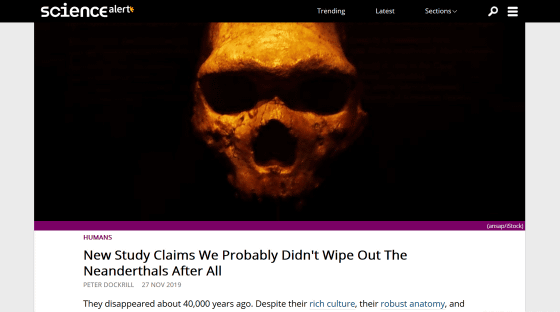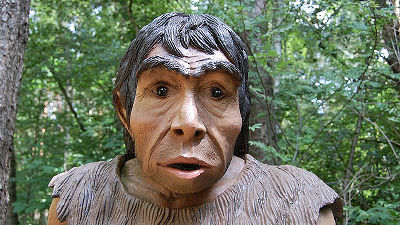Claim that Neanderthals were not extinct by humans, but `` extinction on their own ''

by
Neanderthals , a human genus that emerged about 400,000 years ago, have coexisted with modern humans on the earth for hundreds of thousands of years, but are said to have been extinct about 40,000 years ago. Although the theory that the Neanderthals were extinct is said to have been destroyed by collisions with modern humans , a new study found that Neanderthals disappeared irrespective of modern humans. Is likely to be.
Inbreeding, Allee effects and stochasticity might be sufficient to account for Neanderthal extinction
https://journals.plos.org/plosone/article?id=10.1371/journal.pone.0225117
New Study Claims We Probably Didn't Wipe Out The Neanderthals After All
https://www.sciencealert.com/how-a-perfect-storm-of-sex-and-population-size-may-have-sealed-the-neanderthals-fate

Neanderthals who lived around Europe have larger brain capacities than modern humans,
It turns out that human beings and Neanderthals had sex since anticipated-GIGAZINE

by Angela Marie
However, the Neanderthals eventually disappeared, and only Homo sapiens , a modern human, remains on Earth as a genus of humanity until today. There are many hypotheses as to why the Neanderthals have become extinct, but many hypotheses speculate that the conflict between modern humans and the Neanderthals has forced the Neanderthals to extinction. .
However, a new study conducted by a team at Eindhoven University of Technology and Leiden University in the Netherlands has shown that the extinction of Neanderthals is likely not due to modern humans. Associate professor Krist Vaesen of the research team said, 'Is the Neanderthal perished for us? No, this study suggests that this is not the case. It may have been just an unfortunate event. '
Vaesen's research team assumed a Neanderthal society of various sizes of 50 people, 100 people, 1000 people, 5000 people, and performed population simulation ignoring direct competition factors with humans . In the simulation, the research team considered the effects of inbreeding, the Ally effect that the individual's fitness to the environment decreases due to the decrease in population density, and randomness such as birth rate, mortality rate, and gender ratio.
Population simulations have shown that even if competition, such as direct conflicts with humans and competition for resources, is eliminated, Neanderthals will be extinct with a high probability in 10,000 years at most. Since the Neanderthal population was quite small before meeting humanity, it was likely that simply saying 'the population was small' would make it extinct without any special external factors.

by 12019
'Our findings support the hypothesis that the Neanderthal extinction is the result of demographic factors only; that is, it is only the result of internal dynamics that work in small populations.' The team points out. The Neanderthal population is estimated to have been around 5,000 to 70,000, and if the number drops to around a few thousand, it will easily become extinct with a little unlucky.
In addition, the research team speculates that modern humans may have contributed to accelerating extinction by `` mating with Neanderthals '' instead of direct clashes and competition for resources. . It seems that the cross between modern humans and Neanderthals may have reduced the population of even pure blooded Neanderthals, making it impossible to maintain the population. 'Thus, the presence of modern humans on the Eurasian continent is likely to have accelerated the Neanderthal extinction process,' the research team said.
Related Posts:







